Sainsbury's Operations: Review, Challenges, and Recommendations
VerifiedAdded on 2023/06/12
|18
|5147
|461
Report
AI Summary
This report provides a comprehensive review and critique of Sainsbury's operations management, focusing on the input-transformation-output process, the role and importance of operations management, and the operational challenges faced by the company. It delves into the company's overview, operational functions, and measurement of operational performance, offering technological recommendations for improvement. Additionally, the report examines quality and supply chain management strategies, discussing different approaches to quality management, the role of quality management in optimizing business performance, and the supply chain performance objectives of Sainsbury's. It includes a critical evaluation and recommendations for supply chain management, highlighting the need for innovation and adaptation to maintain competitiveness in the UK retail market. The document is available on Desklib, where students can find a wealth of study resources, including past papers and solved assignments.
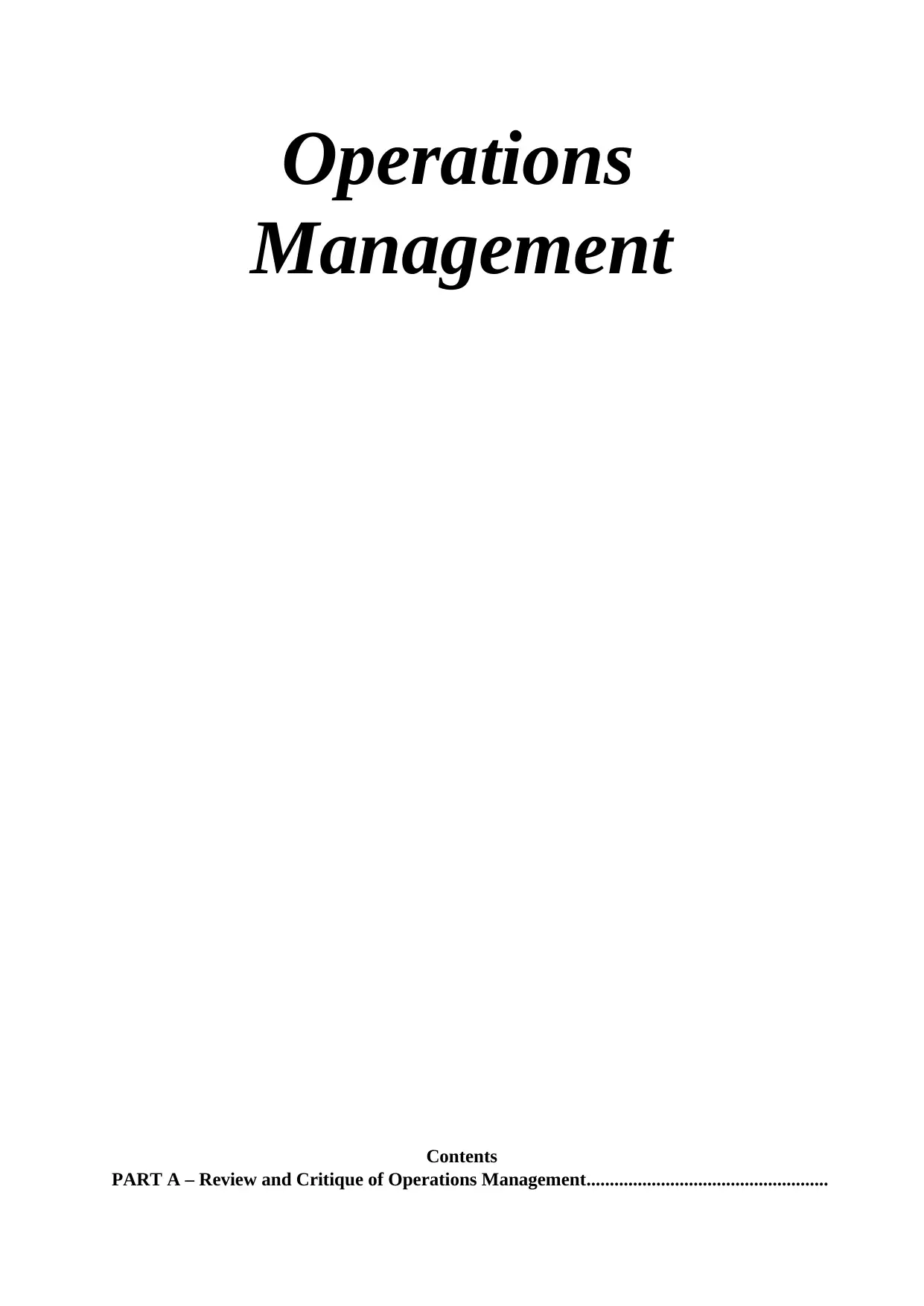
Operations
Management
Contents
PART A – Review and Critique of Operations Management....................................................
Management
Contents
PART A – Review and Critique of Operations Management....................................................
Paraphrase This Document
Need a fresh take? Get an instant paraphrase of this document with our AI Paraphraser
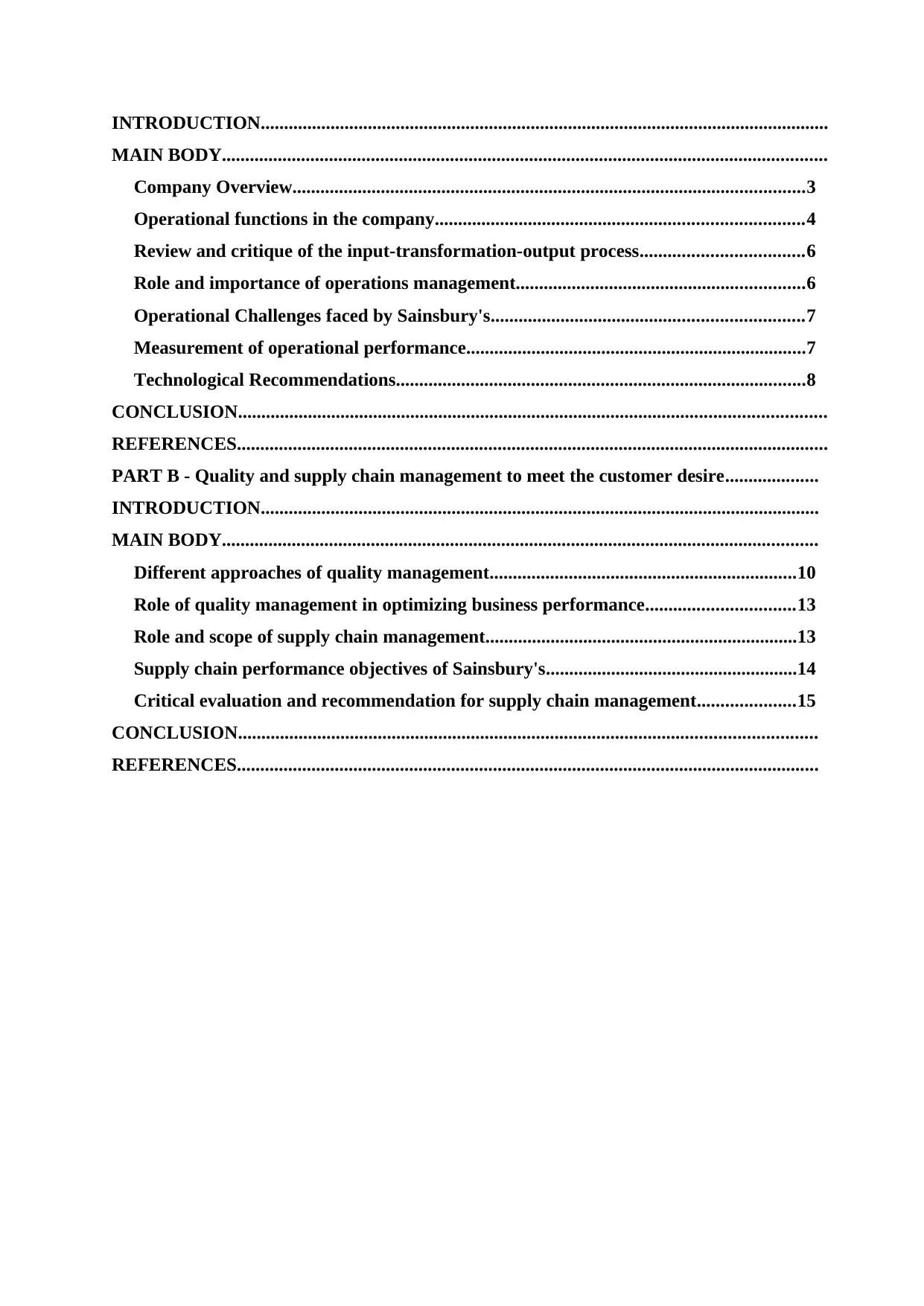
INTRODUCTION..........................................................................................................................
MAIN BODY..................................................................................................................................
Company Overview..............................................................................................................3
Operational functions in the company...............................................................................4
Review and critique of the input-transformation-output process...................................6
Role and importance of operations management..............................................................6
Operational Challenges faced by Sainsbury's...................................................................7
Measurement of operational performance.........................................................................7
Technological Recommendations........................................................................................8
CONCLUSION..............................................................................................................................
REFERENCES...............................................................................................................................
PART B - Quality and supply chain management to meet the customer desire....................
INTRODUCTION........................................................................................................................
MAIN BODY................................................................................................................................
Different approaches of quality management..................................................................10
Role of quality management in optimizing business performance................................13
Role and scope of supply chain management...................................................................13
Supply chain performance objectives of Sainsbury's......................................................14
Critical evaluation and recommendation for supply chain management.....................15
CONCLUSION............................................................................................................................
REFERENCES.............................................................................................................................
MAIN BODY..................................................................................................................................
Company Overview..............................................................................................................3
Operational functions in the company...............................................................................4
Review and critique of the input-transformation-output process...................................6
Role and importance of operations management..............................................................6
Operational Challenges faced by Sainsbury's...................................................................7
Measurement of operational performance.........................................................................7
Technological Recommendations........................................................................................8
CONCLUSION..............................................................................................................................
REFERENCES...............................................................................................................................
PART B - Quality and supply chain management to meet the customer desire....................
INTRODUCTION........................................................................................................................
MAIN BODY................................................................................................................................
Different approaches of quality management..................................................................10
Role of quality management in optimizing business performance................................13
Role and scope of supply chain management...................................................................13
Supply chain performance objectives of Sainsbury's......................................................14
Critical evaluation and recommendation for supply chain management.....................15
CONCLUSION............................................................................................................................
REFERENCES.............................................................................................................................
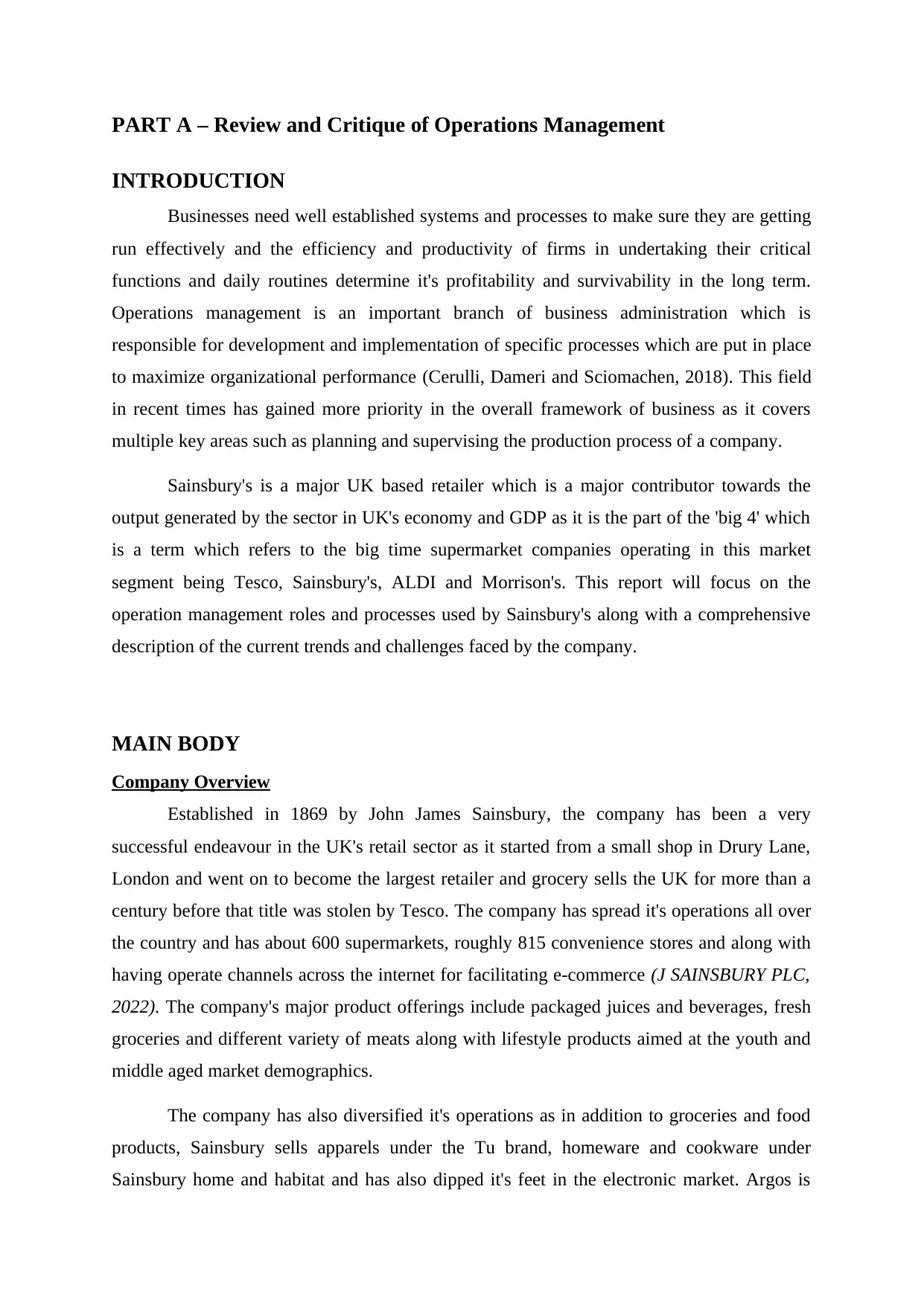
PART A – Review and Critique of Operations Management
INTRODUCTION
Businesses need well established systems and processes to make sure they are getting
run effectively and the efficiency and productivity of firms in undertaking their critical
functions and daily routines determine it's profitability and survivability in the long term.
Operations management is an important branch of business administration which is
responsible for development and implementation of specific processes which are put in place
to maximize organizational performance (Cerulli, Dameri and Sciomachen, 2018). This field
in recent times has gained more priority in the overall framework of business as it covers
multiple key areas such as planning and supervising the production process of a company.
Sainsbury's is a major UK based retailer which is a major contributor towards the
output generated by the sector in UK's economy and GDP as it is the part of the 'big 4' which
is a term which refers to the big time supermarket companies operating in this market
segment being Tesco, Sainsbury's, ALDI and Morrison's. This report will focus on the
operation management roles and processes used by Sainsbury's along with a comprehensive
description of the current trends and challenges faced by the company.
MAIN BODY
Company Overview
Established in 1869 by John James Sainsbury, the company has been a very
successful endeavour in the UK's retail sector as it started from a small shop in Drury Lane,
London and went on to become the largest retailer and grocery sells the UK for more than a
century before that title was stolen by Tesco. The company has spread it's operations all over
the country and has about 600 supermarkets, roughly 815 convenience stores and along with
having operate channels across the internet for facilitating e-commerce (J SAINSBURY PLC,
2022). The company's major product offerings include packaged juices and beverages, fresh
groceries and different variety of meats along with lifestyle products aimed at the youth and
middle aged market demographics.
The company has also diversified it's operations as in addition to groceries and food
products, Sainsbury sells apparels under the Tu brand, homeware and cookware under
Sainsbury home and habitat and has also dipped it's feet in the electronic market. Argos is
INTRODUCTION
Businesses need well established systems and processes to make sure they are getting
run effectively and the efficiency and productivity of firms in undertaking their critical
functions and daily routines determine it's profitability and survivability in the long term.
Operations management is an important branch of business administration which is
responsible for development and implementation of specific processes which are put in place
to maximize organizational performance (Cerulli, Dameri and Sciomachen, 2018). This field
in recent times has gained more priority in the overall framework of business as it covers
multiple key areas such as planning and supervising the production process of a company.
Sainsbury's is a major UK based retailer which is a major contributor towards the
output generated by the sector in UK's economy and GDP as it is the part of the 'big 4' which
is a term which refers to the big time supermarket companies operating in this market
segment being Tesco, Sainsbury's, ALDI and Morrison's. This report will focus on the
operation management roles and processes used by Sainsbury's along with a comprehensive
description of the current trends and challenges faced by the company.
MAIN BODY
Company Overview
Established in 1869 by John James Sainsbury, the company has been a very
successful endeavour in the UK's retail sector as it started from a small shop in Drury Lane,
London and went on to become the largest retailer and grocery sells the UK for more than a
century before that title was stolen by Tesco. The company has spread it's operations all over
the country and has about 600 supermarkets, roughly 815 convenience stores and along with
having operate channels across the internet for facilitating e-commerce (J SAINSBURY PLC,
2022). The company's major product offerings include packaged juices and beverages, fresh
groceries and different variety of meats along with lifestyle products aimed at the youth and
middle aged market demographics.
The company has also diversified it's operations as in addition to groceries and food
products, Sainsbury sells apparels under the Tu brand, homeware and cookware under
Sainsbury home and habitat and has also dipped it's feet in the electronic market. Argos is
⊘ This is a preview!⊘
Do you want full access?
Subscribe today to unlock all pages.

Trusted by 1+ million students worldwide
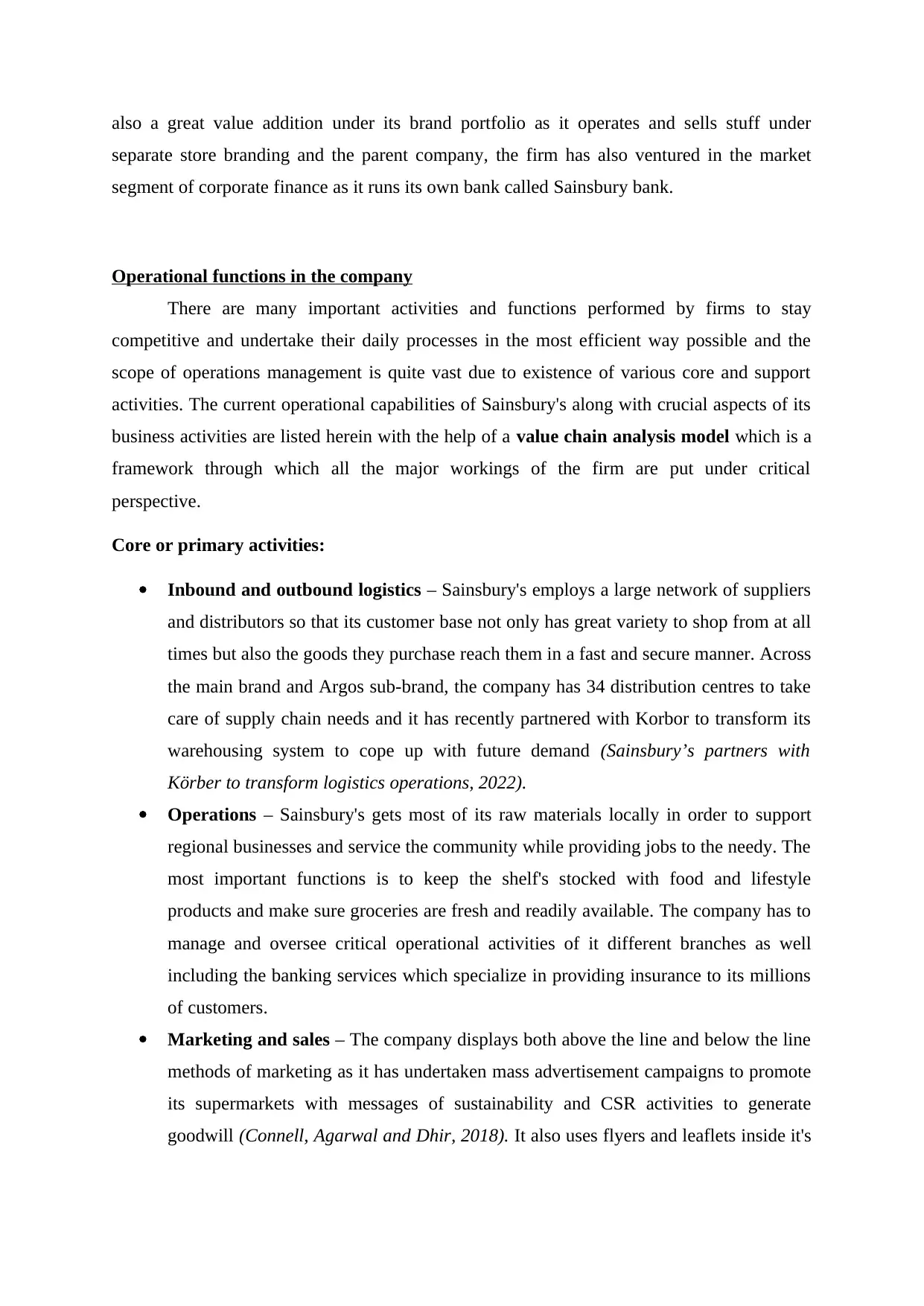
also a great value addition under its brand portfolio as it operates and sells stuff under
separate store branding and the parent company, the firm has also ventured in the market
segment of corporate finance as it runs its own bank called Sainsbury bank.
Operational functions in the company
There are many important activities and functions performed by firms to stay
competitive and undertake their daily processes in the most efficient way possible and the
scope of operations management is quite vast due to existence of various core and support
activities. The current operational capabilities of Sainsbury's along with crucial aspects of its
business activities are listed herein with the help of a value chain analysis model which is a
framework through which all the major workings of the firm are put under critical
perspective.
Core or primary activities:
Inbound and outbound logistics – Sainsbury's employs a large network of suppliers
and distributors so that its customer base not only has great variety to shop from at all
times but also the goods they purchase reach them in a fast and secure manner. Across
the main brand and Argos sub-brand, the company has 34 distribution centres to take
care of supply chain needs and it has recently partnered with Korbor to transform its
warehousing system to cope up with future demand (Sainsbury’s partners with
Körber to transform logistics operations, 2022).
Operations – Sainsbury's gets most of its raw materials locally in order to support
regional businesses and service the community while providing jobs to the needy. The
most important functions is to keep the shelf's stocked with food and lifestyle
products and make sure groceries are fresh and readily available. The company has to
manage and oversee critical operational activities of it different branches as well
including the banking services which specialize in providing insurance to its millions
of customers.
Marketing and sales – The company displays both above the line and below the line
methods of marketing as it has undertaken mass advertisement campaigns to promote
its supermarkets with messages of sustainability and CSR activities to generate
goodwill (Connell, Agarwal and Dhir, 2018). It also uses flyers and leaflets inside it's
separate store branding and the parent company, the firm has also ventured in the market
segment of corporate finance as it runs its own bank called Sainsbury bank.
Operational functions in the company
There are many important activities and functions performed by firms to stay
competitive and undertake their daily processes in the most efficient way possible and the
scope of operations management is quite vast due to existence of various core and support
activities. The current operational capabilities of Sainsbury's along with crucial aspects of its
business activities are listed herein with the help of a value chain analysis model which is a
framework through which all the major workings of the firm are put under critical
perspective.
Core or primary activities:
Inbound and outbound logistics – Sainsbury's employs a large network of suppliers
and distributors so that its customer base not only has great variety to shop from at all
times but also the goods they purchase reach them in a fast and secure manner. Across
the main brand and Argos sub-brand, the company has 34 distribution centres to take
care of supply chain needs and it has recently partnered with Korbor to transform its
warehousing system to cope up with future demand (Sainsbury’s partners with
Körber to transform logistics operations, 2022).
Operations – Sainsbury's gets most of its raw materials locally in order to support
regional businesses and service the community while providing jobs to the needy. The
most important functions is to keep the shelf's stocked with food and lifestyle
products and make sure groceries are fresh and readily available. The company has to
manage and oversee critical operational activities of it different branches as well
including the banking services which specialize in providing insurance to its millions
of customers.
Marketing and sales – The company displays both above the line and below the line
methods of marketing as it has undertaken mass advertisement campaigns to promote
its supermarkets with messages of sustainability and CSR activities to generate
goodwill (Connell, Agarwal and Dhir, 2018). It also uses flyers and leaflets inside it's
Paraphrase This Document
Need a fresh take? Get an instant paraphrase of this document with our AI Paraphraser
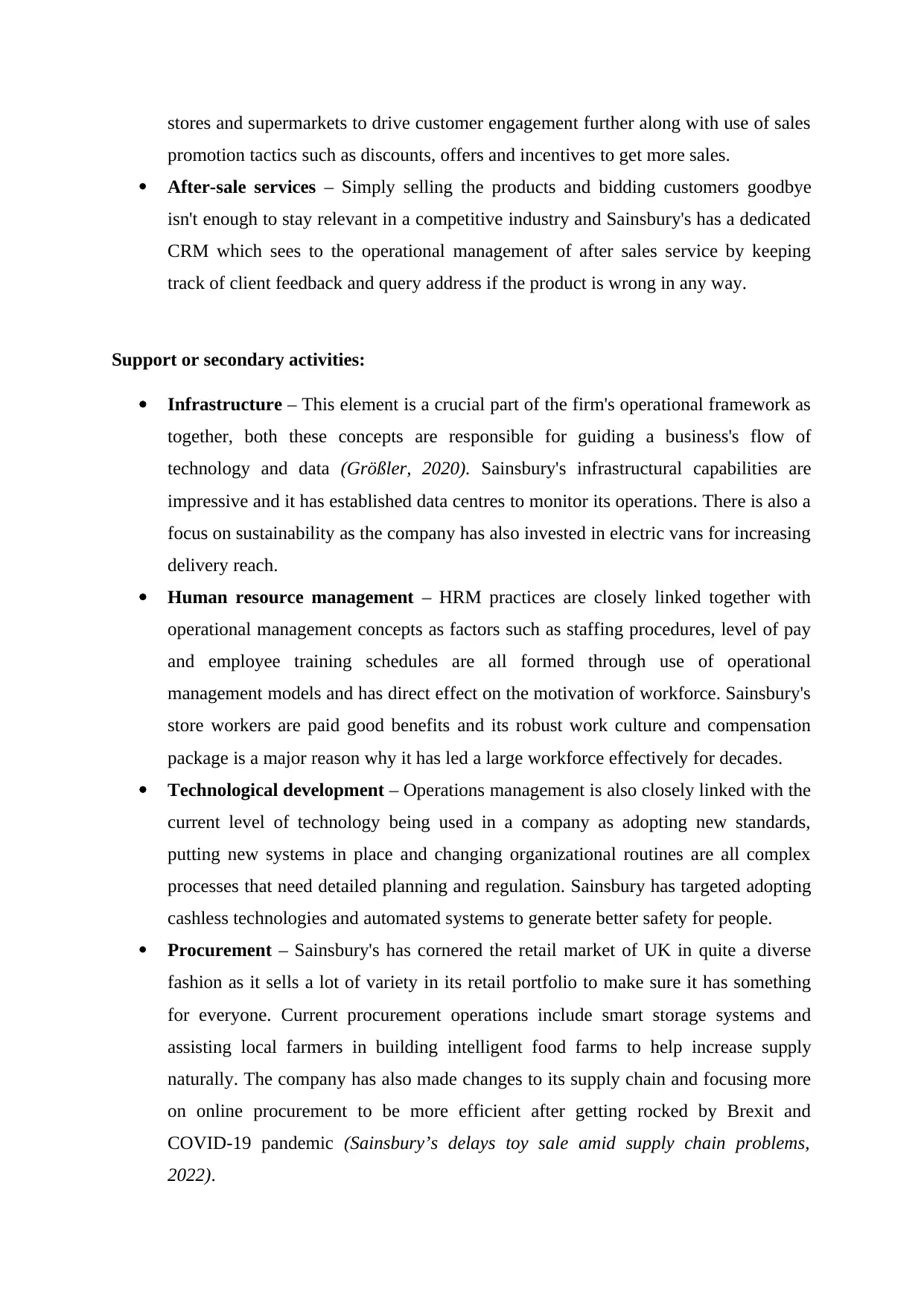
stores and supermarkets to drive customer engagement further along with use of sales
promotion tactics such as discounts, offers and incentives to get more sales.
After-sale services – Simply selling the products and bidding customers goodbye
isn't enough to stay relevant in a competitive industry and Sainsbury's has a dedicated
CRM which sees to the operational management of after sales service by keeping
track of client feedback and query address if the product is wrong in any way.
Support or secondary activities:
Infrastructure – This element is a crucial part of the firm's operational framework as
together, both these concepts are responsible for guiding a business's flow of
technology and data (Größler, 2020). Sainsbury's infrastructural capabilities are
impressive and it has established data centres to monitor its operations. There is also a
focus on sustainability as the company has also invested in electric vans for increasing
delivery reach.
Human resource management – HRM practices are closely linked together with
operational management concepts as factors such as staffing procedures, level of pay
and employee training schedules are all formed through use of operational
management models and has direct effect on the motivation of workforce. Sainsbury's
store workers are paid good benefits and its robust work culture and compensation
package is a major reason why it has led a large workforce effectively for decades.
Technological development – Operations management is also closely linked with the
current level of technology being used in a company as adopting new standards,
putting new systems in place and changing organizational routines are all complex
processes that need detailed planning and regulation. Sainsbury has targeted adopting
cashless technologies and automated systems to generate better safety for people.
Procurement – Sainsbury's has cornered the retail market of UK in quite a diverse
fashion as it sells a lot of variety in its retail portfolio to make sure it has something
for everyone. Current procurement operations include smart storage systems and
assisting local farmers in building intelligent food farms to help increase supply
naturally. The company has also made changes to its supply chain and focusing more
on online procurement to be more efficient after getting rocked by Brexit and
COVID-19 pandemic (Sainsbury’s delays toy sale amid supply chain problems,
2022).
promotion tactics such as discounts, offers and incentives to get more sales.
After-sale services – Simply selling the products and bidding customers goodbye
isn't enough to stay relevant in a competitive industry and Sainsbury's has a dedicated
CRM which sees to the operational management of after sales service by keeping
track of client feedback and query address if the product is wrong in any way.
Support or secondary activities:
Infrastructure – This element is a crucial part of the firm's operational framework as
together, both these concepts are responsible for guiding a business's flow of
technology and data (Größler, 2020). Sainsbury's infrastructural capabilities are
impressive and it has established data centres to monitor its operations. There is also a
focus on sustainability as the company has also invested in electric vans for increasing
delivery reach.
Human resource management – HRM practices are closely linked together with
operational management concepts as factors such as staffing procedures, level of pay
and employee training schedules are all formed through use of operational
management models and has direct effect on the motivation of workforce. Sainsbury's
store workers are paid good benefits and its robust work culture and compensation
package is a major reason why it has led a large workforce effectively for decades.
Technological development – Operations management is also closely linked with the
current level of technology being used in a company as adopting new standards,
putting new systems in place and changing organizational routines are all complex
processes that need detailed planning and regulation. Sainsbury has targeted adopting
cashless technologies and automated systems to generate better safety for people.
Procurement – Sainsbury's has cornered the retail market of UK in quite a diverse
fashion as it sells a lot of variety in its retail portfolio to make sure it has something
for everyone. Current procurement operations include smart storage systems and
assisting local farmers in building intelligent food farms to help increase supply
naturally. The company has also made changes to its supply chain and focusing more
on online procurement to be more efficient after getting rocked by Brexit and
COVID-19 pandemic (Sainsbury’s delays toy sale amid supply chain problems,
2022).
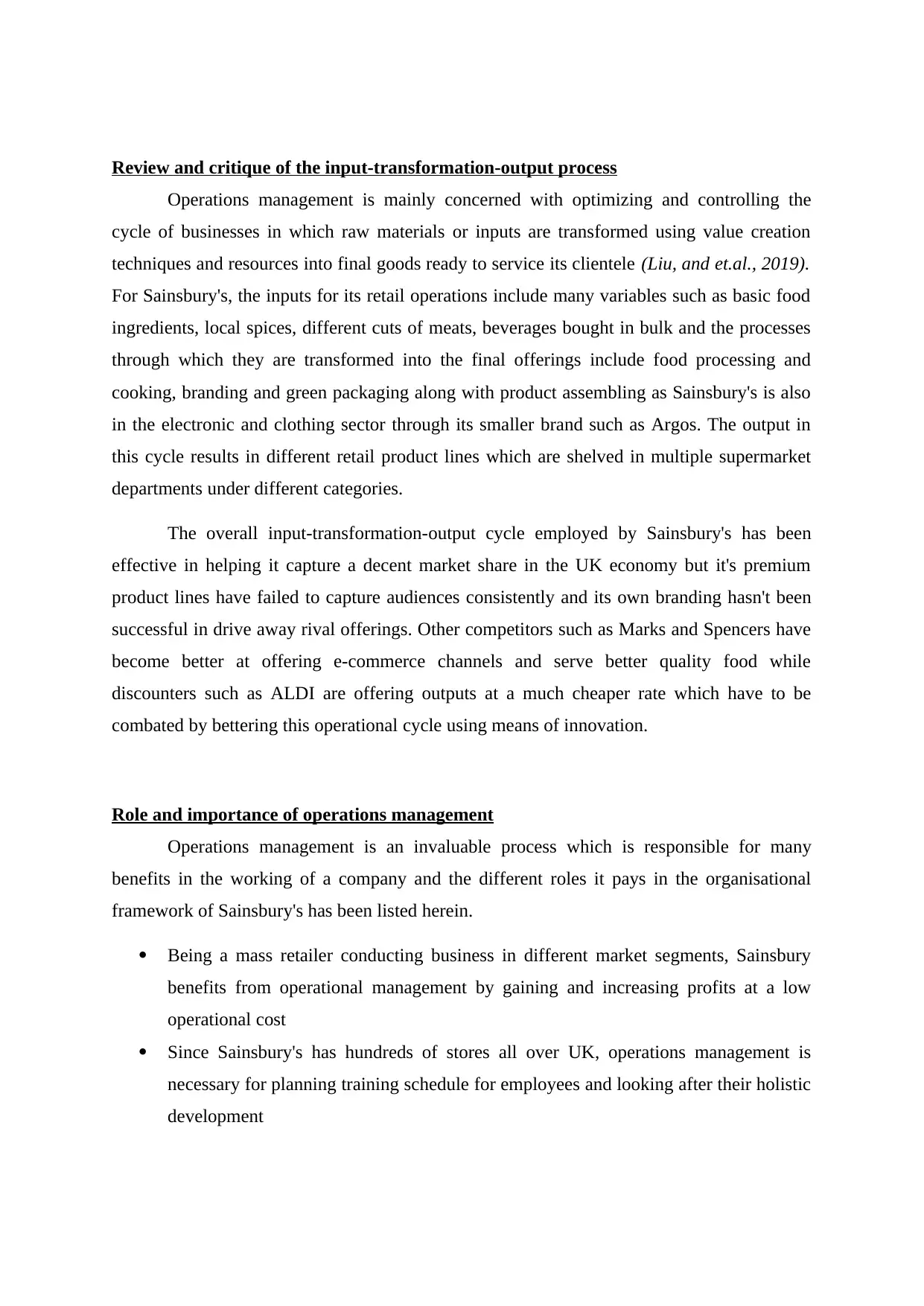
Review and critique of the input-transformation-output process
Operations management is mainly concerned with optimizing and controlling the
cycle of businesses in which raw materials or inputs are transformed using value creation
techniques and resources into final goods ready to service its clientele (Liu, and et.al., 2019).
For Sainsbury's, the inputs for its retail operations include many variables such as basic food
ingredients, local spices, different cuts of meats, beverages bought in bulk and the processes
through which they are transformed into the final offerings include food processing and
cooking, branding and green packaging along with product assembling as Sainsbury's is also
in the electronic and clothing sector through its smaller brand such as Argos. The output in
this cycle results in different retail product lines which are shelved in multiple supermarket
departments under different categories.
The overall input-transformation-output cycle employed by Sainsbury's has been
effective in helping it capture a decent market share in the UK economy but it's premium
product lines have failed to capture audiences consistently and its own branding hasn't been
successful in drive away rival offerings. Other competitors such as Marks and Spencers have
become better at offering e-commerce channels and serve better quality food while
discounters such as ALDI are offering outputs at a much cheaper rate which have to be
combated by bettering this operational cycle using means of innovation.
Role and importance of operations management
Operations management is an invaluable process which is responsible for many
benefits in the working of a company and the different roles it pays in the organisational
framework of Sainsbury's has been listed herein.
Being a mass retailer conducting business in different market segments, Sainsbury
benefits from operational management by gaining and increasing profits at a low
operational cost
Since Sainsbury's has hundreds of stores all over UK, operations management is
necessary for planning training schedule for employees and looking after their holistic
development
Operations management is mainly concerned with optimizing and controlling the
cycle of businesses in which raw materials or inputs are transformed using value creation
techniques and resources into final goods ready to service its clientele (Liu, and et.al., 2019).
For Sainsbury's, the inputs for its retail operations include many variables such as basic food
ingredients, local spices, different cuts of meats, beverages bought in bulk and the processes
through which they are transformed into the final offerings include food processing and
cooking, branding and green packaging along with product assembling as Sainsbury's is also
in the electronic and clothing sector through its smaller brand such as Argos. The output in
this cycle results in different retail product lines which are shelved in multiple supermarket
departments under different categories.
The overall input-transformation-output cycle employed by Sainsbury's has been
effective in helping it capture a decent market share in the UK economy but it's premium
product lines have failed to capture audiences consistently and its own branding hasn't been
successful in drive away rival offerings. Other competitors such as Marks and Spencers have
become better at offering e-commerce channels and serve better quality food while
discounters such as ALDI are offering outputs at a much cheaper rate which have to be
combated by bettering this operational cycle using means of innovation.
Role and importance of operations management
Operations management is an invaluable process which is responsible for many
benefits in the working of a company and the different roles it pays in the organisational
framework of Sainsbury's has been listed herein.
Being a mass retailer conducting business in different market segments, Sainsbury
benefits from operational management by gaining and increasing profits at a low
operational cost
Since Sainsbury's has hundreds of stores all over UK, operations management is
necessary for planning training schedule for employees and looking after their holistic
development
⊘ This is a preview!⊘
Do you want full access?
Subscribe today to unlock all pages.

Trusted by 1+ million students worldwide
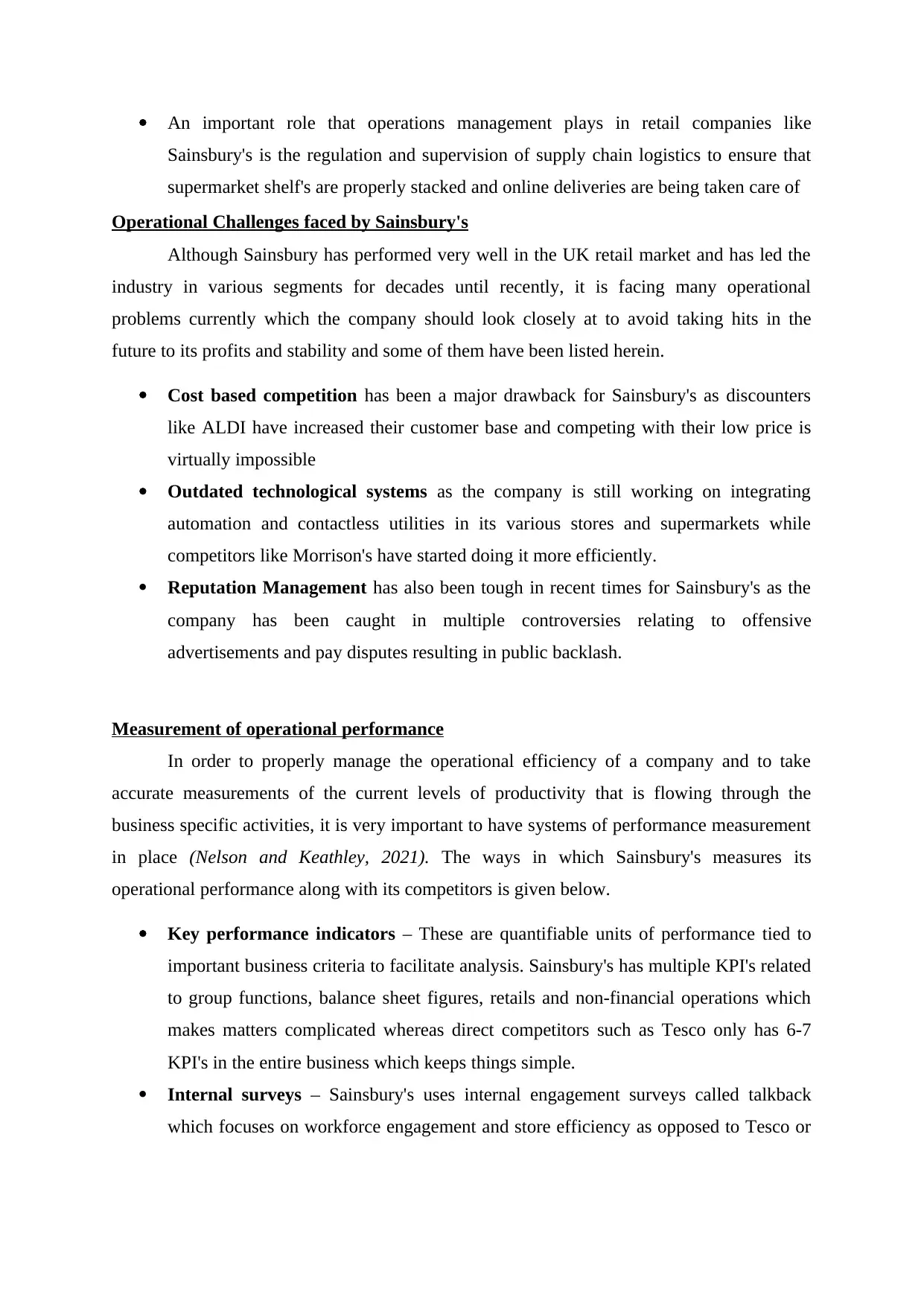
An important role that operations management plays in retail companies like
Sainsbury's is the regulation and supervision of supply chain logistics to ensure that
supermarket shelf's are properly stacked and online deliveries are being taken care of
Operational Challenges faced by Sainsbury's
Although Sainsbury has performed very well in the UK retail market and has led the
industry in various segments for decades until recently, it is facing many operational
problems currently which the company should look closely at to avoid taking hits in the
future to its profits and stability and some of them have been listed herein.
Cost based competition has been a major drawback for Sainsbury's as discounters
like ALDI have increased their customer base and competing with their low price is
virtually impossible
Outdated technological systems as the company is still working on integrating
automation and contactless utilities in its various stores and supermarkets while
competitors like Morrison's have started doing it more efficiently.
Reputation Management has also been tough in recent times for Sainsbury's as the
company has been caught in multiple controversies relating to offensive
advertisements and pay disputes resulting in public backlash.
Measurement of operational performance
In order to properly manage the operational efficiency of a company and to take
accurate measurements of the current levels of productivity that is flowing through the
business specific activities, it is very important to have systems of performance measurement
in place (Nelson and Keathley, 2021). The ways in which Sainsbury's measures its
operational performance along with its competitors is given below.
Key performance indicators – These are quantifiable units of performance tied to
important business criteria to facilitate analysis. Sainsbury's has multiple KPI's related
to group functions, balance sheet figures, retails and non-financial operations which
makes matters complicated whereas direct competitors such as Tesco only has 6-7
KPI's in the entire business which keeps things simple.
Internal surveys – Sainsbury's uses internal engagement surveys called talkback
which focuses on workforce engagement and store efficiency as opposed to Tesco or
Sainsbury's is the regulation and supervision of supply chain logistics to ensure that
supermarket shelf's are properly stacked and online deliveries are being taken care of
Operational Challenges faced by Sainsbury's
Although Sainsbury has performed very well in the UK retail market and has led the
industry in various segments for decades until recently, it is facing many operational
problems currently which the company should look closely at to avoid taking hits in the
future to its profits and stability and some of them have been listed herein.
Cost based competition has been a major drawback for Sainsbury's as discounters
like ALDI have increased their customer base and competing with their low price is
virtually impossible
Outdated technological systems as the company is still working on integrating
automation and contactless utilities in its various stores and supermarkets while
competitors like Morrison's have started doing it more efficiently.
Reputation Management has also been tough in recent times for Sainsbury's as the
company has been caught in multiple controversies relating to offensive
advertisements and pay disputes resulting in public backlash.
Measurement of operational performance
In order to properly manage the operational efficiency of a company and to take
accurate measurements of the current levels of productivity that is flowing through the
business specific activities, it is very important to have systems of performance measurement
in place (Nelson and Keathley, 2021). The ways in which Sainsbury's measures its
operational performance along with its competitors is given below.
Key performance indicators – These are quantifiable units of performance tied to
important business criteria to facilitate analysis. Sainsbury's has multiple KPI's related
to group functions, balance sheet figures, retails and non-financial operations which
makes matters complicated whereas direct competitors such as Tesco only has 6-7
KPI's in the entire business which keeps things simple.
Internal surveys – Sainsbury's uses internal engagement surveys called talkback
which focuses on workforce engagement and store efficiency as opposed to Tesco or
Paraphrase This Document
Need a fresh take? Get an instant paraphrase of this document with our AI Paraphraser
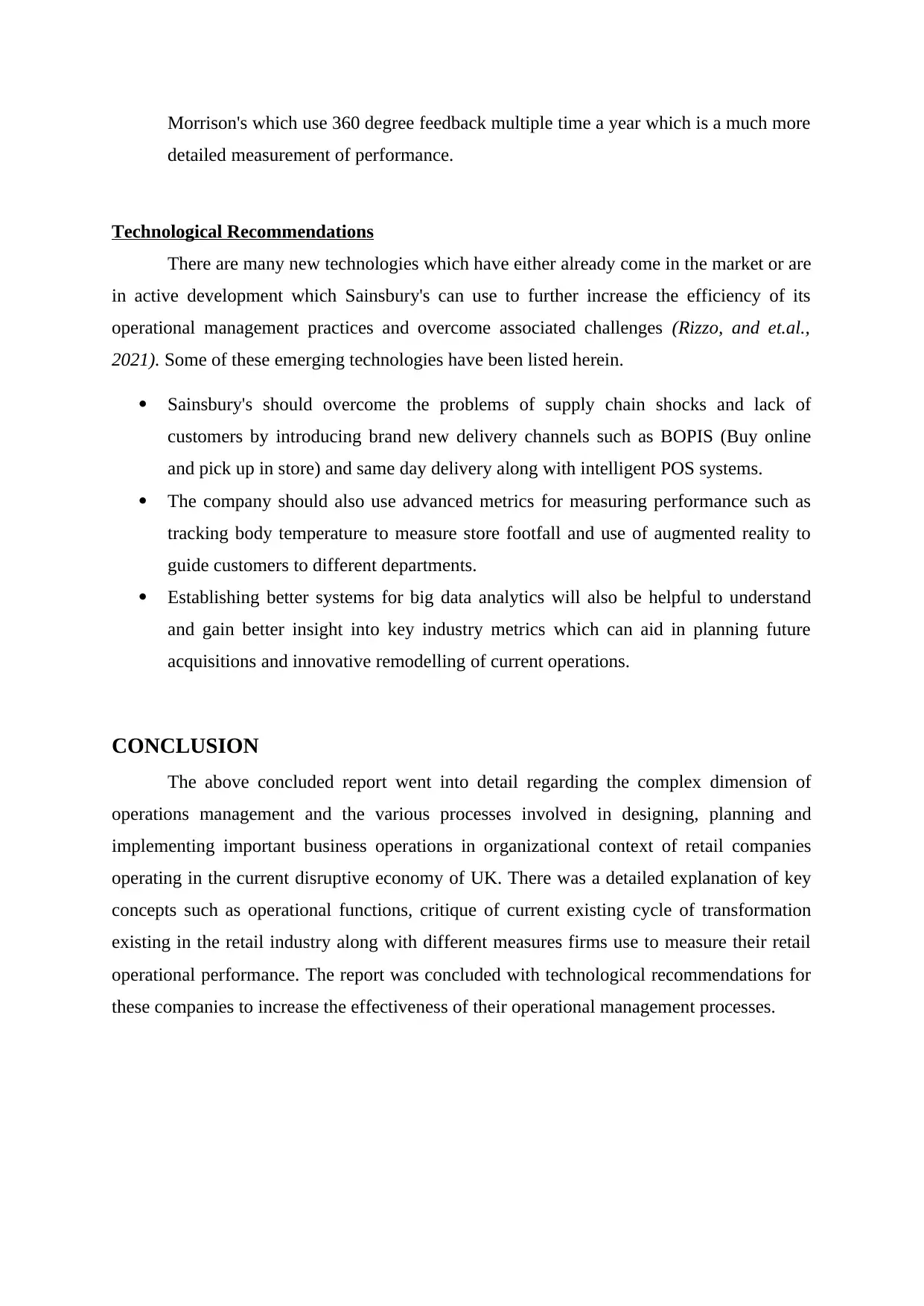
Morrison's which use 360 degree feedback multiple time a year which is a much more
detailed measurement of performance.
Technological Recommendations
There are many new technologies which have either already come in the market or are
in active development which Sainsbury's can use to further increase the efficiency of its
operational management practices and overcome associated challenges (Rizzo, and et.al.,
2021). Some of these emerging technologies have been listed herein.
Sainsbury's should overcome the problems of supply chain shocks and lack of
customers by introducing brand new delivery channels such as BOPIS (Buy online
and pick up in store) and same day delivery along with intelligent POS systems.
The company should also use advanced metrics for measuring performance such as
tracking body temperature to measure store footfall and use of augmented reality to
guide customers to different departments.
Establishing better systems for big data analytics will also be helpful to understand
and gain better insight into key industry metrics which can aid in planning future
acquisitions and innovative remodelling of current operations.
CONCLUSION
The above concluded report went into detail regarding the complex dimension of
operations management and the various processes involved in designing, planning and
implementing important business operations in organizational context of retail companies
operating in the current disruptive economy of UK. There was a detailed explanation of key
concepts such as operational functions, critique of current existing cycle of transformation
existing in the retail industry along with different measures firms use to measure their retail
operational performance. The report was concluded with technological recommendations for
these companies to increase the effectiveness of their operational management processes.
detailed measurement of performance.
Technological Recommendations
There are many new technologies which have either already come in the market or are
in active development which Sainsbury's can use to further increase the efficiency of its
operational management practices and overcome associated challenges (Rizzo, and et.al.,
2021). Some of these emerging technologies have been listed herein.
Sainsbury's should overcome the problems of supply chain shocks and lack of
customers by introducing brand new delivery channels such as BOPIS (Buy online
and pick up in store) and same day delivery along with intelligent POS systems.
The company should also use advanced metrics for measuring performance such as
tracking body temperature to measure store footfall and use of augmented reality to
guide customers to different departments.
Establishing better systems for big data analytics will also be helpful to understand
and gain better insight into key industry metrics which can aid in planning future
acquisitions and innovative remodelling of current operations.
CONCLUSION
The above concluded report went into detail regarding the complex dimension of
operations management and the various processes involved in designing, planning and
implementing important business operations in organizational context of retail companies
operating in the current disruptive economy of UK. There was a detailed explanation of key
concepts such as operational functions, critique of current existing cycle of transformation
existing in the retail industry along with different measures firms use to measure their retail
operational performance. The report was concluded with technological recommendations for
these companies to increase the effectiveness of their operational management processes.
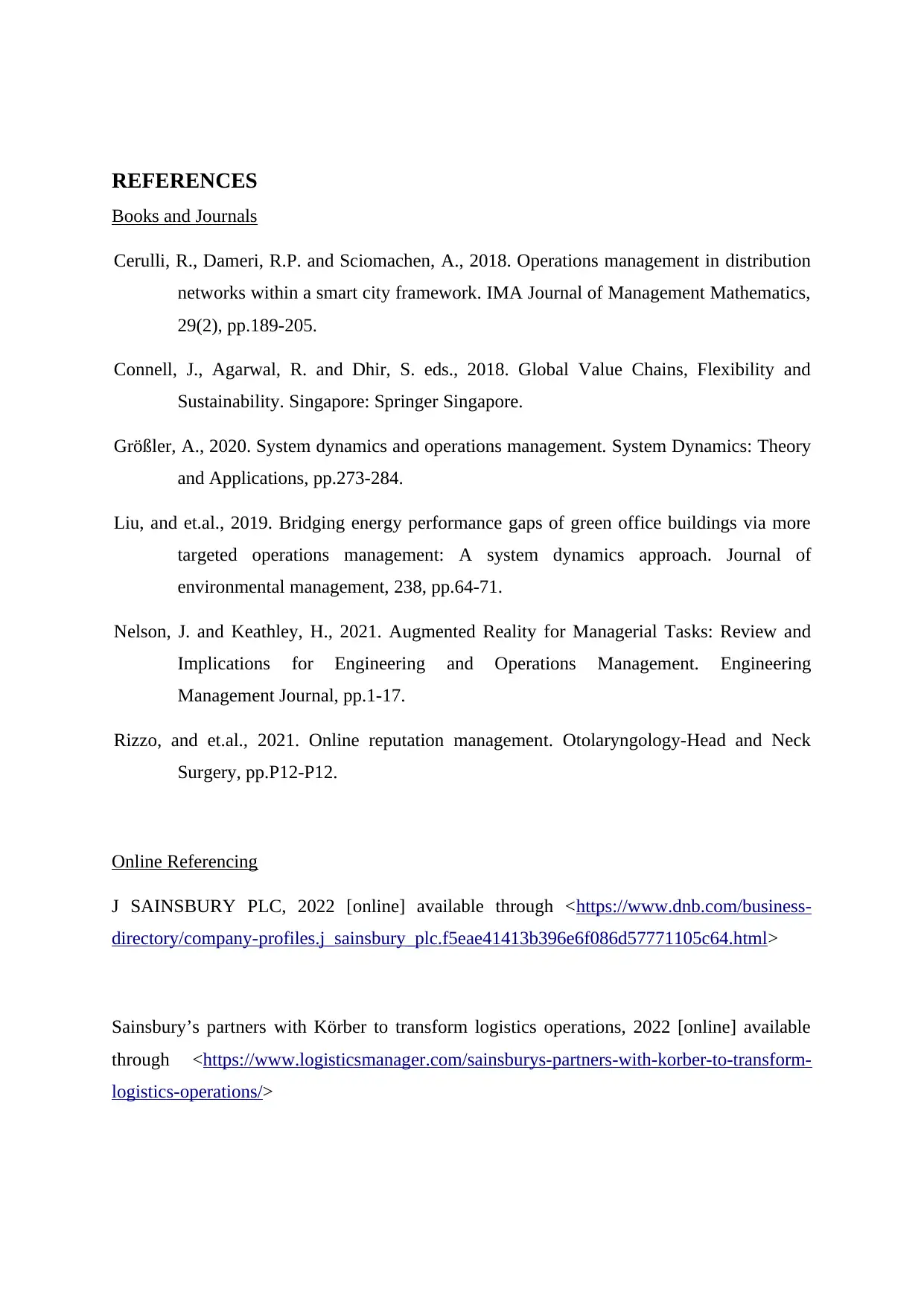
REFERENCES
Books and Journals
Cerulli, R., Dameri, R.P. and Sciomachen, A., 2018. Operations management in distribution
networks within a smart city framework. IMA Journal of Management Mathematics,
29(2), pp.189-205.
Connell, J., Agarwal, R. and Dhir, S. eds., 2018. Global Value Chains, Flexibility and
Sustainability. Singapore: Springer Singapore.
Größler, A., 2020. System dynamics and operations management. System Dynamics: Theory
and Applications, pp.273-284.
Liu, and et.al., 2019. Bridging energy performance gaps of green office buildings via more
targeted operations management: A system dynamics approach. Journal of
environmental management, 238, pp.64-71.
Nelson, J. and Keathley, H., 2021. Augmented Reality for Managerial Tasks: Review and
Implications for Engineering and Operations Management. Engineering
Management Journal, pp.1-17.
Rizzo, and et.al., 2021. Online reputation management. Otolaryngology-Head and Neck
Surgery, pp.P12-P12.
Online Referencing
J SAINSBURY PLC, 2022 [online] available through <https://www.dnb.com/business-
directory/company-profiles.j_sainsbury_plc.f5eae41413b396e6f086d57771105c64.html>
Sainsbury’s partners with Körber to transform logistics operations, 2022 [online] available
through <https://www.logisticsmanager.com/sainsburys-partners-with-korber-to-transform-
logistics-operations/>
Books and Journals
Cerulli, R., Dameri, R.P. and Sciomachen, A., 2018. Operations management in distribution
networks within a smart city framework. IMA Journal of Management Mathematics,
29(2), pp.189-205.
Connell, J., Agarwal, R. and Dhir, S. eds., 2018. Global Value Chains, Flexibility and
Sustainability. Singapore: Springer Singapore.
Größler, A., 2020. System dynamics and operations management. System Dynamics: Theory
and Applications, pp.273-284.
Liu, and et.al., 2019. Bridging energy performance gaps of green office buildings via more
targeted operations management: A system dynamics approach. Journal of
environmental management, 238, pp.64-71.
Nelson, J. and Keathley, H., 2021. Augmented Reality for Managerial Tasks: Review and
Implications for Engineering and Operations Management. Engineering
Management Journal, pp.1-17.
Rizzo, and et.al., 2021. Online reputation management. Otolaryngology-Head and Neck
Surgery, pp.P12-P12.
Online Referencing
J SAINSBURY PLC, 2022 [online] available through <https://www.dnb.com/business-
directory/company-profiles.j_sainsbury_plc.f5eae41413b396e6f086d57771105c64.html>
Sainsbury’s partners with Körber to transform logistics operations, 2022 [online] available
through <https://www.logisticsmanager.com/sainsburys-partners-with-korber-to-transform-
logistics-operations/>
⊘ This is a preview!⊘
Do you want full access?
Subscribe today to unlock all pages.

Trusted by 1+ million students worldwide
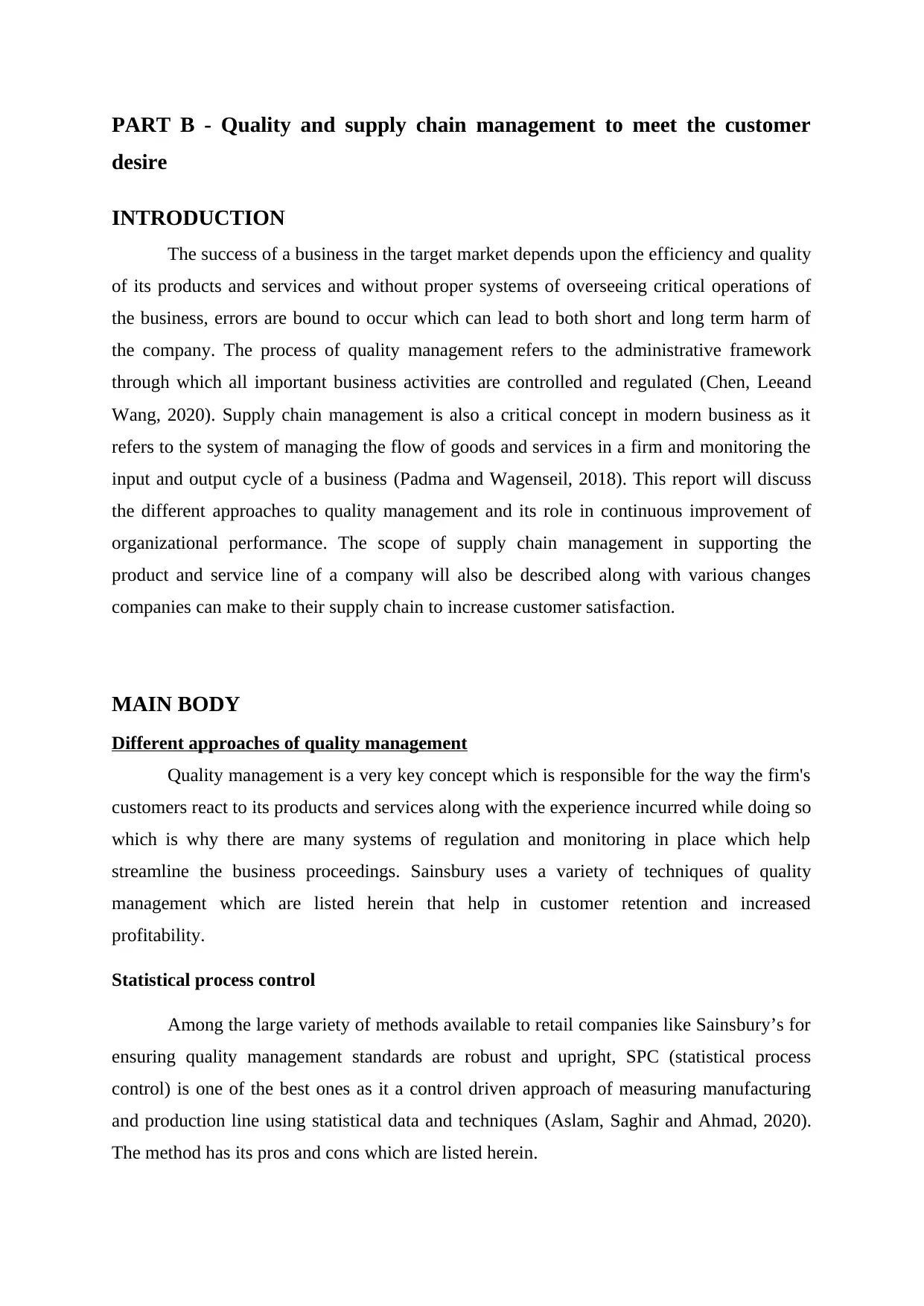
PART B - Quality and supply chain management to meet the customer
desire
INTRODUCTION
The success of a business in the target market depends upon the efficiency and quality
of its products and services and without proper systems of overseeing critical operations of
the business, errors are bound to occur which can lead to both short and long term harm of
the company. The process of quality management refers to the administrative framework
through which all important business activities are controlled and regulated (Chen, Leeand
Wang, 2020). Supply chain management is also a critical concept in modern business as it
refers to the system of managing the flow of goods and services in a firm and monitoring the
input and output cycle of a business (Padma and Wagenseil, 2018). This report will discuss
the different approaches to quality management and its role in continuous improvement of
organizational performance. The scope of supply chain management in supporting the
product and service line of a company will also be described along with various changes
companies can make to their supply chain to increase customer satisfaction.
MAIN BODY
Different approaches of quality management
Quality management is a very key concept which is responsible for the way the firm's
customers react to its products and services along with the experience incurred while doing so
which is why there are many systems of regulation and monitoring in place which help
streamline the business proceedings. Sainsbury uses a variety of techniques of quality
management which are listed herein that help in customer retention and increased
profitability.
Statistical process control
Among the large variety of methods available to retail companies like Sainsbury’s for
ensuring quality management standards are robust and upright, SPC (statistical process
control) is one of the best ones as it a control driven approach of measuring manufacturing
and production line using statistical data and techniques (Aslam, Saghir and Ahmad, 2020).
The method has its pros and cons which are listed herein.
desire
INTRODUCTION
The success of a business in the target market depends upon the efficiency and quality
of its products and services and without proper systems of overseeing critical operations of
the business, errors are bound to occur which can lead to both short and long term harm of
the company. The process of quality management refers to the administrative framework
through which all important business activities are controlled and regulated (Chen, Leeand
Wang, 2020). Supply chain management is also a critical concept in modern business as it
refers to the system of managing the flow of goods and services in a firm and monitoring the
input and output cycle of a business (Padma and Wagenseil, 2018). This report will discuss
the different approaches to quality management and its role in continuous improvement of
organizational performance. The scope of supply chain management in supporting the
product and service line of a company will also be described along with various changes
companies can make to their supply chain to increase customer satisfaction.
MAIN BODY
Different approaches of quality management
Quality management is a very key concept which is responsible for the way the firm's
customers react to its products and services along with the experience incurred while doing so
which is why there are many systems of regulation and monitoring in place which help
streamline the business proceedings. Sainsbury uses a variety of techniques of quality
management which are listed herein that help in customer retention and increased
profitability.
Statistical process control
Among the large variety of methods available to retail companies like Sainsbury’s for
ensuring quality management standards are robust and upright, SPC (statistical process
control) is one of the best ones as it a control driven approach of measuring manufacturing
and production line using statistical data and techniques (Aslam, Saghir and Ahmad, 2020).
The method has its pros and cons which are listed herein.
Paraphrase This Document
Need a fresh take? Get an instant paraphrase of this document with our AI Paraphraser
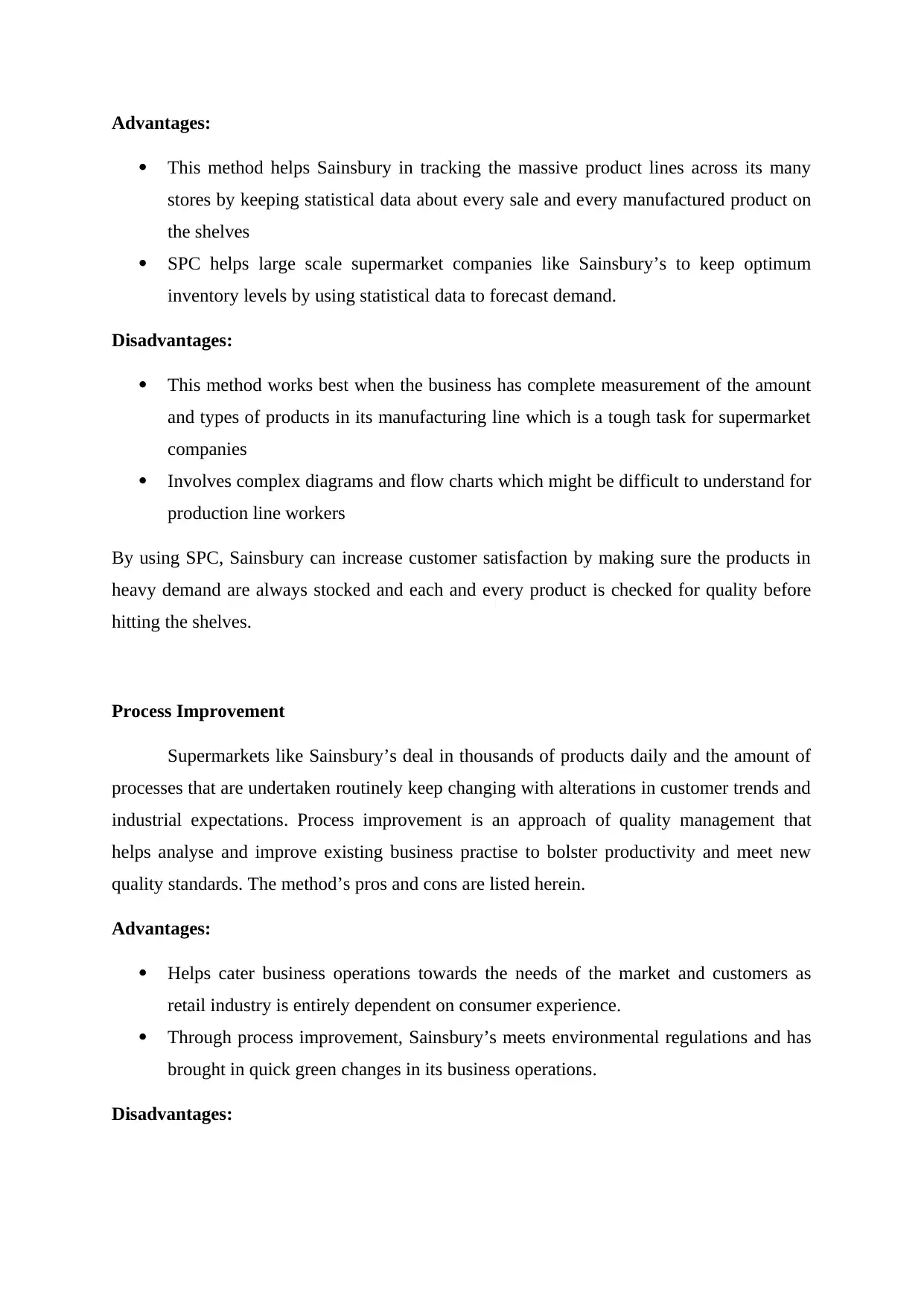
Advantages:
This method helps Sainsbury in tracking the massive product lines across its many
stores by keeping statistical data about every sale and every manufactured product on
the shelves
SPC helps large scale supermarket companies like Sainsbury’s to keep optimum
inventory levels by using statistical data to forecast demand.
Disadvantages:
This method works best when the business has complete measurement of the amount
and types of products in its manufacturing line which is a tough task for supermarket
companies
Involves complex diagrams and flow charts which might be difficult to understand for
production line workers
By using SPC, Sainsbury can increase customer satisfaction by making sure the products in
heavy demand are always stocked and each and every product is checked for quality before
hitting the shelves.
Process Improvement
Supermarkets like Sainsbury’s deal in thousands of products daily and the amount of
processes that are undertaken routinely keep changing with alterations in customer trends and
industrial expectations. Process improvement is an approach of quality management that
helps analyse and improve existing business practise to bolster productivity and meet new
quality standards. The method’s pros and cons are listed herein.
Advantages:
Helps cater business operations towards the needs of the market and customers as
retail industry is entirely dependent on consumer experience.
Through process improvement, Sainsbury’s meets environmental regulations and has
brought in quick green changes in its business operations.
Disadvantages:
This method helps Sainsbury in tracking the massive product lines across its many
stores by keeping statistical data about every sale and every manufactured product on
the shelves
SPC helps large scale supermarket companies like Sainsbury’s to keep optimum
inventory levels by using statistical data to forecast demand.
Disadvantages:
This method works best when the business has complete measurement of the amount
and types of products in its manufacturing line which is a tough task for supermarket
companies
Involves complex diagrams and flow charts which might be difficult to understand for
production line workers
By using SPC, Sainsbury can increase customer satisfaction by making sure the products in
heavy demand are always stocked and each and every product is checked for quality before
hitting the shelves.
Process Improvement
Supermarkets like Sainsbury’s deal in thousands of products daily and the amount of
processes that are undertaken routinely keep changing with alterations in customer trends and
industrial expectations. Process improvement is an approach of quality management that
helps analyse and improve existing business practise to bolster productivity and meet new
quality standards. The method’s pros and cons are listed herein.
Advantages:
Helps cater business operations towards the needs of the market and customers as
retail industry is entirely dependent on consumer experience.
Through process improvement, Sainsbury’s meets environmental regulations and has
brought in quick green changes in its business operations.
Disadvantages:
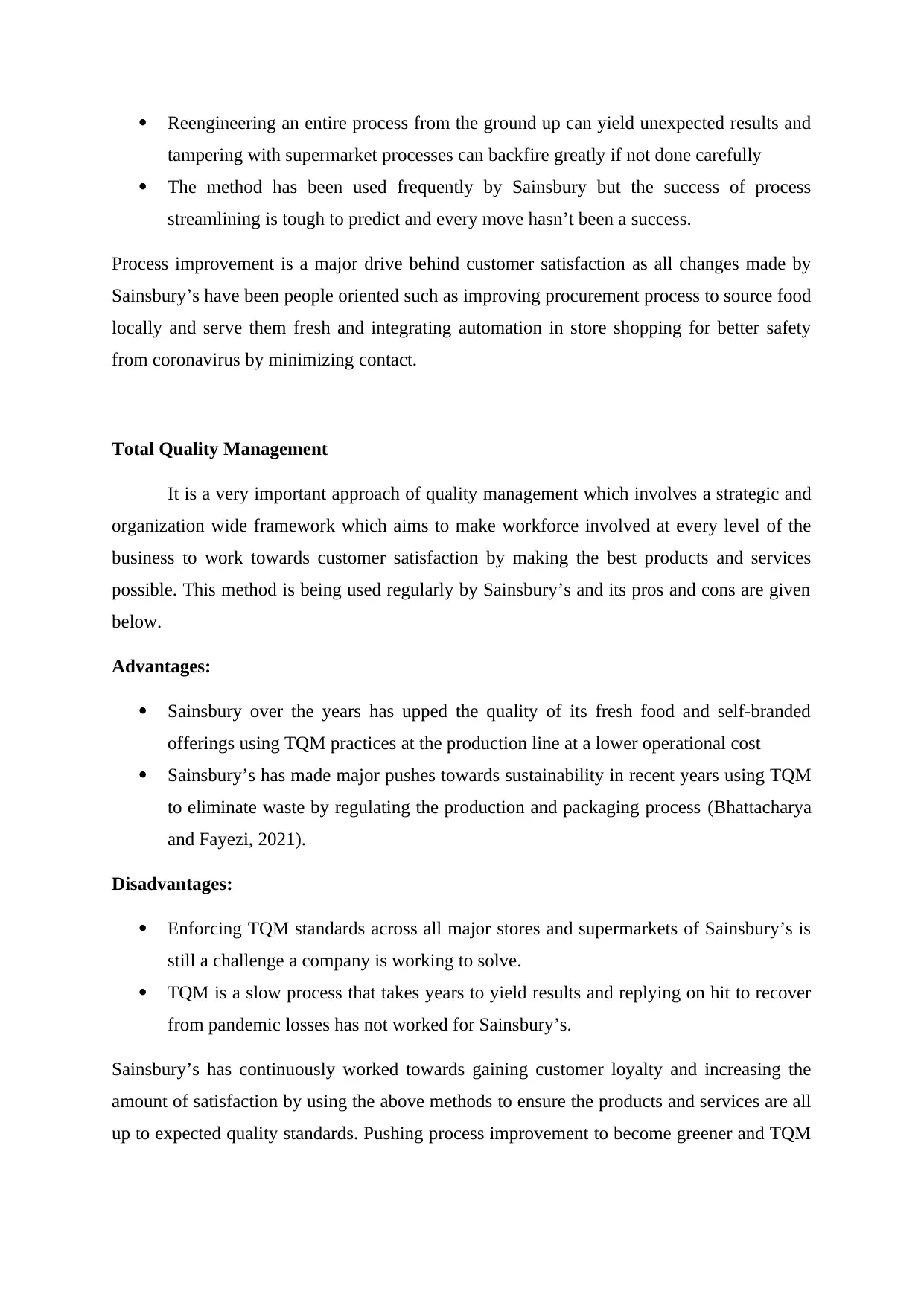
Reengineering an entire process from the ground up can yield unexpected results and
tampering with supermarket processes can backfire greatly if not done carefully
The method has been used frequently by Sainsbury but the success of process
streamlining is tough to predict and every move hasn’t been a success.
Process improvement is a major drive behind customer satisfaction as all changes made by
Sainsbury’s have been people oriented such as improving procurement process to source food
locally and serve them fresh and integrating automation in store shopping for better safety
from coronavirus by minimizing contact.
Total Quality Management
It is a very important approach of quality management which involves a strategic and
organization wide framework which aims to make workforce involved at every level of the
business to work towards customer satisfaction by making the best products and services
possible. This method is being used regularly by Sainsbury’s and its pros and cons are given
below.
Advantages:
Sainsbury over the years has upped the quality of its fresh food and self-branded
offerings using TQM practices at the production line at a lower operational cost
Sainsbury’s has made major pushes towards sustainability in recent years using TQM
to eliminate waste by regulating the production and packaging process (Bhattacharya
and Fayezi, 2021).
Disadvantages:
Enforcing TQM standards across all major stores and supermarkets of Sainsbury’s is
still a challenge a company is working to solve.
TQM is a slow process that takes years to yield results and replying on hit to recover
from pandemic losses has not worked for Sainsbury’s.
Sainsbury’s has continuously worked towards gaining customer loyalty and increasing the
amount of satisfaction by using the above methods to ensure the products and services are all
up to expected quality standards. Pushing process improvement to become greener and TQM
tampering with supermarket processes can backfire greatly if not done carefully
The method has been used frequently by Sainsbury but the success of process
streamlining is tough to predict and every move hasn’t been a success.
Process improvement is a major drive behind customer satisfaction as all changes made by
Sainsbury’s have been people oriented such as improving procurement process to source food
locally and serve them fresh and integrating automation in store shopping for better safety
from coronavirus by minimizing contact.
Total Quality Management
It is a very important approach of quality management which involves a strategic and
organization wide framework which aims to make workforce involved at every level of the
business to work towards customer satisfaction by making the best products and services
possible. This method is being used regularly by Sainsbury’s and its pros and cons are given
below.
Advantages:
Sainsbury over the years has upped the quality of its fresh food and self-branded
offerings using TQM practices at the production line at a lower operational cost
Sainsbury’s has made major pushes towards sustainability in recent years using TQM
to eliminate waste by regulating the production and packaging process (Bhattacharya
and Fayezi, 2021).
Disadvantages:
Enforcing TQM standards across all major stores and supermarkets of Sainsbury’s is
still a challenge a company is working to solve.
TQM is a slow process that takes years to yield results and replying on hit to recover
from pandemic losses has not worked for Sainsbury’s.
Sainsbury’s has continuously worked towards gaining customer loyalty and increasing the
amount of satisfaction by using the above methods to ensure the products and services are all
up to expected quality standards. Pushing process improvement to become greener and TQM
⊘ This is a preview!⊘
Do you want full access?
Subscribe today to unlock all pages.

Trusted by 1+ million students worldwide
1 out of 18
Related Documents
Your All-in-One AI-Powered Toolkit for Academic Success.
+13062052269
info@desklib.com
Available 24*7 on WhatsApp / Email
![[object Object]](/_next/static/media/star-bottom.7253800d.svg)
Unlock your academic potential
Copyright © 2020–2026 A2Z Services. All Rights Reserved. Developed and managed by ZUCOL.




